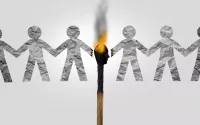30 November 2005Stephen Castle
Europe's claim to the moral high ground over the environment has been comprehensively challenged in a devastating report on its failings in the battle against global warming and pollution. It says Europe is devouring the world's natural resources at twice the global rate.
Climate change on a scale unseen on the European continent for 5,000 years is now under way, according to the report, which warned yesterday that at current rates three quarters of Switzerland's glaciers will have melted by 2050.
Urban areas of Europe will double in size in just over a century, as life expectancy rises and more live alone. Increasing urban sprawl means that in 10 years, an open space in Europe three times the size of Luxembourg has been built on. Air travel is likely to double by 2030 and marine ecosystems, water resources and air quality are all threatened.
Though the European Environment Agency assessment praises many environmental initiatives, it makes it clear that much more needs to be done if a crisis is to be avoided.
Britain, while doing well in some areas, was criticised for the increase in the generation of municipal waste, just 14.5 per cent of which is recycled or composted as opposed to a target of 25 per cent.
But the document, a five-year assessment across 32 countries, concentrates on the threat from climate change. It points out that the four hottest years on record were 1998, 2002, 2003 and 2004, and that 10 per cent of Alpine glaciers disappeared during summer 2003 alone.
Jacqueline McGlade, the agency's executive director, said: "Without effective action over several decades, global warming will see ice sheets melting in the north and the spread of deserts from the south. The continent's population could become concentrated in the centre."
She said the spread of tar and cement across former greenbelt areas was recreating many of the mistakes that led to the devastation caused by Hurricane Katrina in New Orleans, where wetlands were built over. "Even if we constrain global warming to the EU target of a 2C increase, we will be living in atmospheric conditions that human beings have never experienced. Deeper cuts in emissions are needed."
The report's authors believe that individual behaviour needs to change and urged reform of the taxation systems to ensure that polluters pay more.
The document highlights Europe's "ecological footprint", the estimated land area required to produce the resources each person consumes and to absorb the waste they produce. At five global hectares per person, the figure for the 25 EU member states is half of that for the US but larger than Japan and more than double the average for countries such as Brazil, China or India.
Tony Long, director of WWF's European policy office, said this illustrated the extent to which Europeans used more than their fair share of global resources. He argued: "Europe needs to learn to consume less, pollute less and tread more lightly on the planet. Perpetuating the inequality of living at the expense of some of the poorest countries in the world makes European environmental standards nothing to be proud about. This makes the EU's sustainable development strategy even more timely to get Europe back on track to sustainability."
The report points out that Europe's average temperature rose by 0.95C during the last century, higher than the global average of 0.7C. That continuing trend is expected to deliver a rise of between 2 and 6C this century.
Though the document says that in the short term the EU is "broadly on track to meet its Kyoto targets" to curb CO2, "its mid-term goal for 2020 - a 15 to 30 per cent reduction in greenhouse gas emissions from 1990 levels - will be more difficult to achieve".
That message was echoed by the European environment commissioner, Stavros Dimas, who last week described progress on Kyoto in the EU as good but " not enough".
The recommendation for more use of the tax system to discourage waste provoked a political row last night. The agency report called for a "a gradual shift of the tax base away from taxing 'good resources' such as investment and labour, towards taxing 'bad resources', such as pollution and inefficient use".
The European Commission vice-president, Margot Wallstrom, played down the prospects of an EU-wide initiative, arguing that one would be unlikely to win the backing of member states.
John Hontelez, secretary general of the European Environmental Bureau (EEB), a federation of European environmental organisations, said: "The commissioner's answer is unacceptable. The EEA report clearly shows that environmental tax reform is necessary to create realistic market price signals, triggering innovation with much-needed environmental benefits. Refusing to launch a major initiative to boost environmental fiscal reforms inside the EU is refusing leadership in environmental policies. This commission risks going into the record books as the worst one ever for the protection of public health, biodiversity and the planet."
UK
Britain remains off target on renewable energy, which accounts for only 3.6% of electricity needs, against the 10% promised by 2010. A mounting rubbish disposal problem is underlined by a 15 per cent hike in waste production in the past ?ve years. Britain's butterflies such as the Wood White and the Grayling could soon join the large Tortoiseshell in becoming extinct. Loss of habitat means 45 per cent of Europe's butterflies are endangered.
France
Nuclear power has lowered emissions but the transport sector keeps pumping out greenhouse gases. France has to tackle mounting energy consumption and poor waste management.
Germany
Climate change in Europe is predicted to cause more extreme weather, such as heavy rain leading to an increased risk of flooding. The densely populated flood plains of central Europe - in particular Germany - are especially vulnerable to flooding.
Spain
Spain and Portugal suffered one of the worst droughts on record this year, with far-reaching economic consequences. The three hottest years on record in Europe were the past three - 2002, 2003 and 2004.
Finland
Despite its wealth and investment in renewable energy, sparsely populated Finland is among Europe's worst offenders on greenhouse gases, up nearly 10 per cent since 1990.
Switzerland
Global warming is melting the snow caps. Ten per cent of Alpine glaciers disappeared during the summer of 2003 and at current rates, three-quarters of Swiss glaciers will have melted by 2050.
Italy
Like much of southern Europe, Italy's coming crisis is drought. Recent summers highlight the urgent need to improve irrigation in agriculture, to reduce the demand on the water supply.
'Green-friendly' US cuts a lonely figure at UN summit
The Bush administration - widely condemned for its refusal to support the Kyoto treaty - has claimed it is doing more than most nations to protect the Earth's atmosphere.
At the UN Climate Control Conference in Montreal, US officials claimed that emissions of greenhouse gases have been cut by 0.8 per cent since George Bush came to office in 2001. "With regard to what the US is doing on climate change, the actions we have taken are next to none in the world," said Harlan Watson, senior climate negotiator for the US Department of State.
He said the US spends more than US$5bn (£3bn) a year on climate change research and technology, and that President Bush had committed to cutting greenhouses gases by 18 per cent by the year 2012.
Environmentalists said the US was simply trying undermine the conference. Bill Hare of Greenpeace International said the lack of US commitment to mandatory greenhouse gas reductions was the biggest complaint among conference delegates. "When you walk around the conference hall here, delegates are saying there are lots of issues on the agenda, but there's only one real problem, and that's the United States," he said.
Andrew Buncombe






